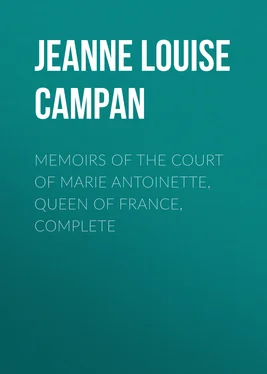Jeanne Louise Henriette Campan - Memoirs of the Court of Marie Antoinette, Queen of France, Complete
Здесь есть возможность читать онлайн «Jeanne Louise Henriette Campan - Memoirs of the Court of Marie Antoinette, Queen of France, Complete» — ознакомительный отрывок электронной книги совершенно бесплатно, а после прочтения отрывка купить полную версию. В некоторых случаях можно слушать аудио, скачать через торрент в формате fb2 и присутствует краткое содержание. Жанр: Биографии и Мемуары, История, foreign_edu, foreign_antique, foreign_prose, на английском языке. Описание произведения, (предисловие) а так же отзывы посетителей доступны на портале библиотеки ЛибКат.
- Название:Memoirs of the Court of Marie Antoinette, Queen of France, Complete
- Автор:
- Жанр:
- Год:неизвестен
- ISBN:нет данных
- Рейтинг книги:5 / 5. Голосов: 1
-
Избранное:Добавить в избранное
- Отзывы:
-
Ваша оценка:
- 100
- 1
- 2
- 3
- 4
- 5
Memoirs of the Court of Marie Antoinette, Queen of France, Complete: краткое содержание, описание и аннотация
Предлагаем к чтению аннотацию, описание, краткое содержание или предисловие (зависит от того, что написал сам автор книги «Memoirs of the Court of Marie Antoinette, Queen of France, Complete»). Если вы не нашли необходимую информацию о книге — напишите в комментариях, мы постараемся отыскать её.
Memoirs of the Court of Marie Antoinette, Queen of France, Complete — читать онлайн ознакомительный отрывок
Ниже представлен текст книги, разбитый по страницам. Система сохранения места последней прочитанной страницы, позволяет с удобством читать онлайн бесплатно книгу «Memoirs of the Court of Marie Antoinette, Queen of France, Complete», без необходимости каждый раз заново искать на чём Вы остановились. Поставьте закладку, и сможете в любой момент перейти на страницу, на которой закончили чтение.
Интервал:
Закладка:
“Yet amidst the most shameful excesses the King sometimes suddenly resumed the dignity of his rank in a very noble manner. The familiar courtiers of Louis XV. had one day abandoned themselves to the unrestrained gaiety, of a supper, after returning from the chase. Each boasted of and described the beauty of his mistress. Some of them amused themselves with giving a particular account of their wives’ personal defects. An imprudent word, addressed to Louis XV., and applicable only to the Queen, instantly dispelled all the mirth of the entertainment. The King assumed his regal air, and knocking with his knife on the table twice or thrice, ‘Gentlemen; said he, ‘here is the King!’
“Those men who are most completely abandoned to dissolute manners are not, on that account, insensible to virtue in women. The Comtesse de Perigord was as beautiful as virtuous. During some excursions she made to Choisy, whither she had been invited, she perceived that the King took great notice of her. Her demeanour of chilling respect, her cautious perseverance in shunning all serious conversation with the monarch, were insufficient to extinguish this rising flame, and he at length addressed a letter to her, worded in the most passionate terms. This excellent woman instantly formed her resolution: honour forbade her returning the King’s passion, whilst her profound respect for the sovereign made her unwilling to disturb his tranquillity. She therefore voluntarily banished herself to an estate she possessed called Chalais, near Barbezieux, the mansion of which had been uninhabited nearly a century; the porter’s lodge was the only place in a condition to receive her. From this seat she wrote to his Majesty, explaining her motives for leaving Court; and she remained there several years without visiting Paris. Louis XV. was speedily attracted by other objects, and regained the composure to which Madame de Perigord had thought it her duty to sacrifice so much. Some years after, Mesdames’ lady of honour died. Many great families solicited the place. The King, without answering any of their applications, wrote to the Comtesse de Perigord: ‘My daughters have just lost their lady of honour; this place, madame, is your due, as much on account of your personal qualities as of the illustrious name of your family.’
“Three young men of the college of St. Germain, who had just completed their course of studies, knowing no person about the Court, and having heard that strangers were always well treated there, resolved to dress themselves completely in the Armenian costume, and, thus clad, to present themselves to see the grand ceremony of the reception of several knights of the Order of the Holy Ghost. Their stratagem met with all the success with which they had flattered themselves. While the procession was passing through the long mirror gallery, the Swiss of the apartments placed them in the first row of spectators, recommending every one to pay all possible attention to the strangers. The latter, however, were imprudent enough to enter the ‘oeil-de-boeuf’ chamber, where, were Messieurs Cardonne and Ruffin, interpreters of Oriental languages, and the first clerk of the consul’s department, whose business it was to attend to everything which related to the natives of the East who were in France. The three scholars were immediately surrounded and questioned by these gentlemen, at first in modern Greek. Without being disconcerted, they made signs that they did not understand it. They were then addressed in Turkish and Arabic; at length one of the interpreters, losing all patience, exclaimed, ‘Gentlemen, you certainly must understand some of the languages in which you have been addressed. What country can you possibly come from then?’—‘From St. Germain-en-Laye, sir,’ replied the boldest among them; ‘this is the first time you have put the question to us in French.’ They then confessed the motive of their disguise; the eldest of them was not more than eighteen years of age. Louis XV. was informed of the affair. He laughed heartily, ordered them a few hours’ confinement and a good admonition, after which they were to be set at liberty.
“Louis XV. liked to talk about death, though he was extremely apprehensive of it; but his excellent health and his royal dignity probably made him imagine himself invulnerable. He often said to people who had very bad colds, ‘You’ve a churchyard cough there.’ Hunting one day in the forest of Senard, in a year in which bread was extremely dear, he met a man on horseback carrying a coffin. ‘Whither are you carrying that coffin?’—‘To the village of –,’ answered the peasant. ‘Is it for a man or a woman?’—‘For a man.’—‘What did he die of?’—‘Of hunger,’ bluntly replied the villager. The King spurred on his horse, and asked no more questions.
“Weak as Louis XV. was, the Parliaments would never have obtained his consent to the convocation of the States General. I heard an anecdote on this subject from two officers attached to that Prince’s household. It was at the period when the remonstrances of the Parliaments, and the refusals to register the decrees for levying taxes, produced alarm with respect to the state of the finances. This became the subject of conversation one evening at the coucher of Louis XV. ‘You will see, Sire,’ said a courtier, whose office placed him in close communication with the King, ‘that all this will make it absolutely necessary to assemble the States General!’
“The King, roused by this speech from the habitual apathy of his character, seized the courtier by the arm, and said to him, in a passion, ‘Never repeat, these words. I am not sanguinary; but had I a brother, and were he to dare to give me such advice, I would sacrifice him, within twenty-four hours, to the duration of the monarchy and the tranquillity of the kingdom.’
“Several years prior to his death the Dauphin, the father of Louis XVI., had confluent smallpox, which endangered his life; and after his convalescence he was long troubled with a malignant ulcer under the nose. He was injudiciously advised to get rid of it by the use of extract of lead, which proved effectual; but from that time the Dauphin, who was corpulent, insensibly grew thin, and a short, dry cough evinced that the humour, driven in, had fallen on the lungs. Some persons also suspected him of having taken acids in too great a quantity for the purpose of reducing his bulk. The state of his health was not, however, such as to excite alarm. At the camp at Compiegne, in July, 1764, the Dauphin reviewed the troops, and evinced much activity in the performance of his duties; it was even observed that he was seeking to gain the attachment of the army. He presented the Dauphiness to the soldiers, saying, with a simplicity which at that time made a great sensation, ‘Mes enfans, here is my wife.’ Returning late on horseback to Compiegne, he found he had taken a chill; the heat of the day had been excessive; the Prince’s clothes had been wet with perspiration. An illness followed, in which the Prince began to spit blood. His principal physician wished to have him bled; the consulting physicians insisted on purgation, and their advice was followed. The pleurisy, being ill cured, assumed and retained all the symptoms of consumption; the Dauphin languished from that period until December, 1765, and died at Fontainebleau, where the Court, on account of his condition, had prolonged its stay, which usually ended on the 2d of November.
“The Dauphiness, his widow, was deeply afflicted; but the immoderate despair which characterised her grief induced many to suspect that the loss of the crown was an important part of the calamity she lamented. She long refused to eat enough to support life; she encouraged her tears to flow by placing portraits of the Dauphin in every retired part of her apartments. She had him represented pale, and ready to expire, in a picture placed at the foot of her bed, under draperies of gray cloth, with which the chambers of the Princesses were always hung in court mournings. Their grand cabinet was hung with black cloth, with an alcove, a canopy, and a throne, on which they received compliments of condolence after the first period of the deep mourning. The Dauphiness, some months before the end of her career, regretted her conduct in abridging it; but it was too late; the fatal blow had been struck. It may also be presumed that living with a consumptive, man had contributed to her complaint. This Princess had no opportunity of displaying her qualities; living in a Court in which she was eclipsed by the King and Queen, the only characteristics that could be remarked in her were her extreme attachment to her husband, and her great piety.
Читать дальшеИнтервал:
Закладка:
Похожие книги на «Memoirs of the Court of Marie Antoinette, Queen of France, Complete»
Представляем Вашему вниманию похожие книги на «Memoirs of the Court of Marie Antoinette, Queen of France, Complete» списком для выбора. Мы отобрали схожую по названию и смыслу литературу в надежде предоставить читателям больше вариантов отыскать новые, интересные, ещё непрочитанные произведения.
Обсуждение, отзывы о книге «Memoirs of the Court of Marie Antoinette, Queen of France, Complete» и просто собственные мнения читателей. Оставьте ваши комментарии, напишите, что Вы думаете о произведении, его смысле или главных героях. Укажите что конкретно понравилось, а что нет, и почему Вы так считаете.












